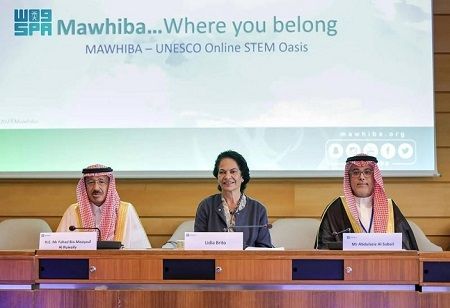Saudi Arabia’s King Abdulaziz and his Companions Foundation for Giftedness and Creativity “Mawhiba” signed a significant partnership agreement with the United Nations Educational, Scientific, and Cultural Organization (UNESCO) to foster science, technology, engineering, and mathematics (STEM) education across Arab countries. The partnership marks a pivotal moment in advancing innovation, creativity, and scientific excellence in the region, Mawhiba said in a statement.
UNESCO Assistant Director-General for Natural Sciences Dr. Lidia Arthur Brito, along with Saudi Ambassador to France and Monaco Fahd bin Mayouf Al-Ruwaili, joined esteemed colleagues and distinguished guests to mark the occasion. The agreement was signed by Abdulaziz bin Saleh Al-Subail, Mawhiba Deputy Secretary-General for Business Development and Communication, and Dr. Lidia Arthur Brito from UNESCO.
Mawhiba Secretary-General Dr. Amal bint Abdullah Al-Hazzaa expressed the foundation's deep honor in partnering with UNESCO. She emphasized their mutual commitment to empowering young Arab minds and promoting sustainable development through education and innovation. Dr. Al-Hazzaa highlighted the Kingdom’s advancements in STEM under the leadership of Custodian of the Two Holy Mosques King Salman bin Abdulaziz and Crown Prince and Prime Minister Prince Mohammed bin Salman. She underscored the significance of this collaboration in the context of Saudi Vision 2030.
Dr. Brito noted that this strategic partnership aims to equip young people with the essential knowledge and skills to inspire them to use science, technology, engineering, and mathematics to tackle global challenges. She added that Mawhiba's experience with Saudi Arabian youth will facilitate the exchange of these experiences on a global scale. Dr. Brito highlighted the potential for expanding these efforts to Africa and other regions to further promote sustainable development goals.
This strategic partnership seeks to enhance STEM education for students from 6th to 12th grade across Arab states, focusing on improving their scientific knowledge, nurturing creativity, and fostering critical thinking. At the core of the initiative is the MAWHIBA-UNESCO Online STEM Oasis, a global platform for local, national, and regional science and engineering fairs. Furthermore, the partnership will conduct real-time assessments of middle and high schools in Arab states to elevate educational standards and infrastructure.
Recognizing the pivotal role of educators, the partnership will focus on training Arab science teachers to lead research and guide students in scientific projects, thereby boosting the overall quality of STEM education. Mawhiba is committed to expanding the use of the UNESCO Open Science Portal and the UNESCO Science-2-Innovation Network to build the capacity of young scientists and women in STEM education globally. Over the past three years, Mawhiba has supported 839 students from Arab states through enriching STEM programs.
The partnership highlights Mawhiba’s leading role in discovering and empowering STEM talents locally and internationally. By collaborating with UNESCO, Mawhiba aims to enhance its capacity to address global challenges such as climate change, health crises, and technological disruptions. The collaboration seeks to inspire young Arab minds to pursue STEM careers, offering them access to cutting-edge research and resources through initiatives like the UNESCO Open Science Portal.
The partnership between Mawhiba and UNESCO represents a shared commitment to fostering a brighter future by building capacities in STEM fields to support sustainable development. Through this collaboration, they aim to create an environment where every young Arab mind can thrive, innovate, and contribute to the global community. This initiative highlights the importance of investing in the future and ensuring every child has the opportunity to explore, experiment, and excel in science and technology.

